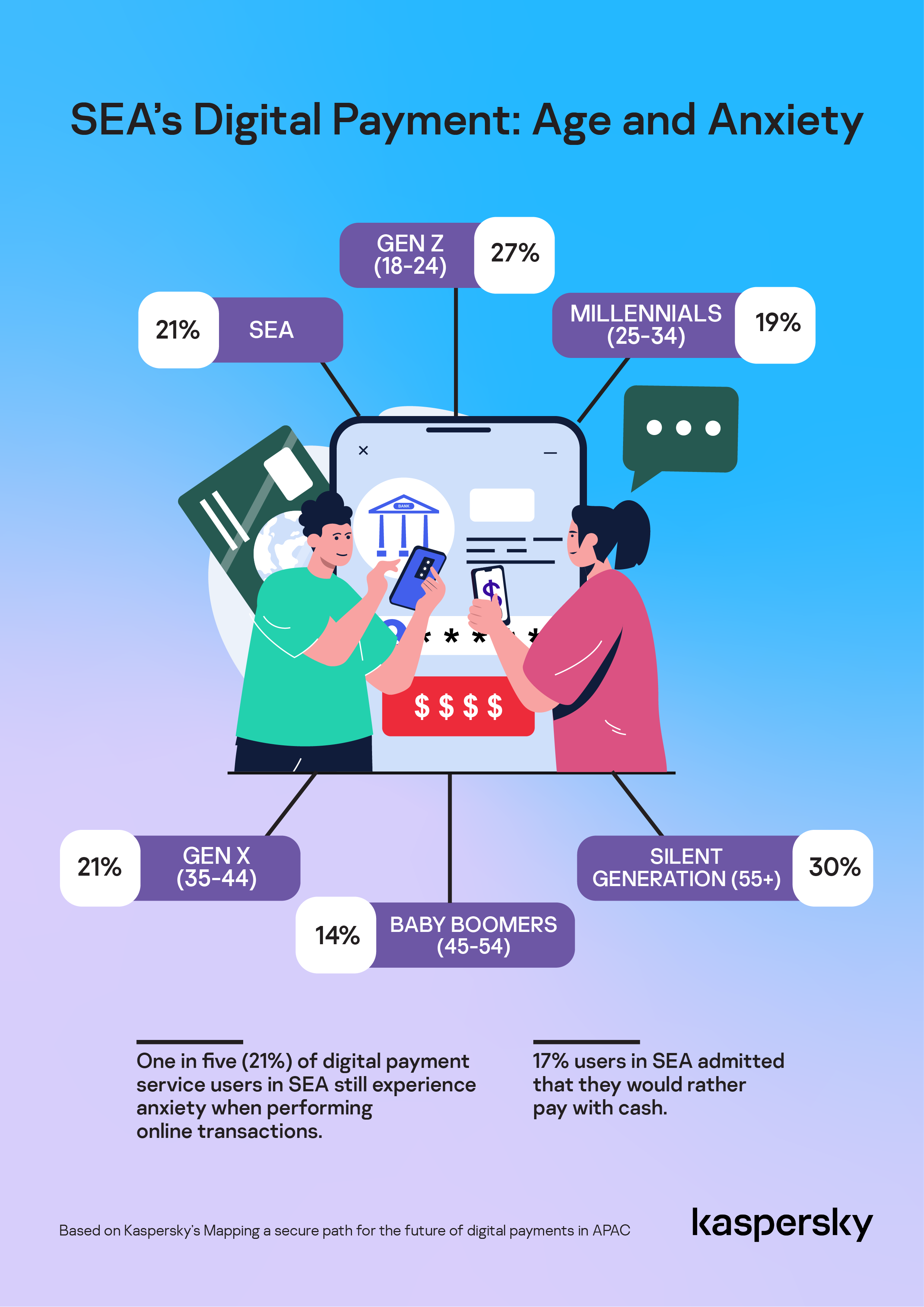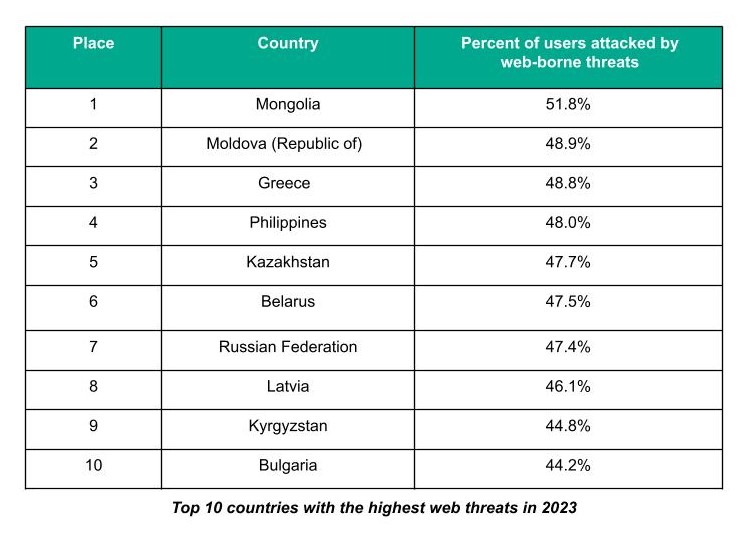COUNT
Kaspersky: Almost 1 in 3 “seniors” in Southeast Asia gets anxious making online payments

May 2, 2022 6:51 p.m.
Digital payment has emerged to be the leading choice for many consumers in Southeast Asia (SEA) when it comes to conducting their online financial transactions. A recent Kaspersky research showed that digital considerations about cybersecurity and payments factor heavily into a consumer’s purchasing behavior in the region.
Titled “Mapping a secure path for the future of digital payments in APAC”, the study discovered that one in five (21%) of digital payment service users in SEA still experience anxiety when performing online transactions. Among other ages, worry is highest with the oldest group, the Silent Generation (30%). Interestingly, the “seniors” are followed by the youngest generation at 27%.
Almost one in five (17%) users in SEA admitted that they would rather pay with cash, wherein the oldest generation again logged the highest percent (20%) among all the age groups.
Adapting to these new technologies can also present a challenge to the Silent Generation with 20% of them noting difficulties on doing financial transactions online.
On the brighter side, nearly a quarter (24%) of all respondents from Southeast Asia indicated that they fully trust digital payments.
“The older adults are not from the internet age. Their worries are understandable and should be seen as a precautionary measure towards making a costly mistakes in a technology they are still learning to use. It is, however, noteworthy that most of them (26%) do trust digital payment platforms. As they are welcome to adopting to changes, we encourage the younger generation to step forward and assist our older loved ones. Community and government awareness and education efforts are also essential,” says Sandra Lee, Managing Director for Asia Pacific at Kaspersky.
Given their preference to being careful online, it is not surprising that the oldest generation favors the efficiency of antivirus software the most. More than three in five (61%) of adults aged 55 and above showed the highest level of trust towards security solutions compared with the younger age groups.
While on the average, half of all generations in SEA (50%) understood the need for antivirus software to protect their money and online data, Gen Z showed the least trust at 46%, Millennials at 49%, and Gen X at 52%.
Almost a quarter (20%) of all respondents felt that the use of antivirus software was sufficient, followed by 17% where respondents were uncertain or unaware about how antivirus could help them mitigate the risk of financial loss.
Alarmingly, there is still some 14% who said that antivirus software was not an essential tool in the fight against cyber threats seeking to compromise financial data and property.
“The true significance of security solutions should be best understood at present time when we hear about scams and financial frauds, one after another. Cybercriminals understand our habits and emotional states, as they are humans, too. We have seen how they are becoming more and more creative in targeting us with their social engineering attacks so we urge all generations to look into safeguarding their devices with the right tools to secure not only their data but most importantly their hard-earned money,” adds Lee.
To help the older adults embrace technologies securely while they are online, Kaspersky experts suggest the following:
- Installing, launching, updating and effectively using devices and apps is an issue for some older users. Parental controls are not just for restricting children’s activities – they can also be used to simplify things for older adults. Controlled user accounts can help manage their computers, devices, and apps by restricting the number of options they have access to so they avoid confusion and inadvertently launching programs. It can also allow remote logins to help manage activities.
- Make sure their apps and programs are set to update automatically so they always have the latest and most secure versions.
- Security solutions and practical steps can minimize the risk of falling victim to threats and keeping financial information safe. Utilize reliable security solutions for comprehensive protection from a wide range of threats, such as Kaspersky Internet Security, Kaspersky Fraud Prevention and the use of Kaspersky Safe Money to help check the authenticity of websites of banks, payment systems and online stores you visit, as well as establish a secure connection.
- Regularly explain to them the essentials of safe internet and cyber hygiene practices. Teach them how to keep their password private, only share information with people they know in real life, only connect to home networks when making online transactions, and never click on doubtful links, etc.
- Encourage them to contact you if they have any questions or require assistance in the digital world.
Users can also opt for the latest offers from the global cybersecurity company here: https://www.kasperskyph.com/
To read the full report, please visit https://kas.pr/b6w8.
Survey Methodology
The Kaspersky “Mapping a digitally secure path for the future of payments in APAC” report studies our interactions with online payments. It also examines our attitudes towards them, which hold the key to understanding the factors that will further drive or stem the adoption of this technology. The study was conducted by research agency YouGov in key territories in APAC, including Australia, China, India, Indonesia, Malaysia, Philippines, Singapore, South Korea, Thailand, and Vietnam (10 countries). Survey responses were gathered in July 2021 with a total of 1,618 respondents surveyed across the stated countries.
The respondents ranged from 18-65 years of age, all of which are working professionals who are digital payment users.
Through this study, when the behavior of the population of a market is generalized, it is in reference to the group of respondents sampled above.
COUNT
PH slides to top 4 in Kaspersky’s new global ranking of countries most targeted by online threats

February 5, 2024 9:46 p.m.
In 2023, web threats targeting the Philippines were about two percent less (48%) than in 2022 (49.8%), according to the latest Kaspersky Security Network (KSN) report.
With this new data, the country moved two spots down to fourth place worldwide among countries most targeted by malicious files from the internet and phishing websites. It looks like a positive development but Kaspersky is strongly advising against dropping the armor.
“There are two things that could explain the drop in web threats, albeit slightly. First is that we see the country is slowly making headway in cybersecurity. We classify the Philippines to be in the intermediate group of countries that are identifying cyberattacks and making efforts to implement rules. The second one and this we have to seriously take note, is that cybercriminals are continuously taking other attack routes that might be off the radar. One trend that we consistently have been seeing lately is their preference for targeted attacks instead of the spray and pray method,” said Yeo Siang Tiong, General Manager for Southeast Asia at Kaspersky.
“Complacency, however, is still not an option. Cybercriminals continue to develop their tools and techniques. They actually surprise cybersecurity experts all the time. Our mindset should be how to be able to hunt threats before they could cause harm and damage. At this point, I recommend that we should be talking more about threats as we proactively learn to detect and respond to them. This is where threat intelligence comes in handy,” added Yeo.
Web or online threats are attacks through browsers which are also cybercriminals’ tried and tested way to spread malware. It can easily be done with or without the involvement of the victim.
A web attack with victim participation is done through social engineering. The victim is tricked into doing something that jeopardizes their personal security or the security of the organization they work for. The objective is to get the victim to respond by clicking an infected email attachment, a compromised website, or responding to a fake unsubscribe notice, among others. Last year’s data breaches involving a government agency and an e-wallet company, which were each reportedly traced to phishing, are examples of this type of web threat.
An attack requiring no victim involvement is through drive-by downloads. By simply visiting a compromised website, their device gets infected automatically (and silently) particularly if they failed to apply a security update to one of their apps. This method is used in most web attacks.
In the recent global ranking, the Philippines came behind Mongolia (51.8%), Moldova (48.9%) and Greece (48.8%). Since 2019, the country has consistently been in the top 10 ranking countries.
Among Southeast Asian countries, the Philippines is trailed by Malaysia with the overall percentage of users attacked by web-borne threats from January to December 2023.
To stay protected, Kaspersky recommends users the following:
- Do not download and install applications from untrusted sources
- Do not click on any links from unknown sources or suspicious online advertisements
- Create strong and unique passwords, including a mix of lower case and upper case letters, numbers, and punctuation, as well as activating two-factor authentication
- Always install updates
- Ignore messages asking to disable security systems for office or cybersecurity solution
- Use a robust cybersecurity solution appropriate to your system type and devices
For organizations, Kaspersky recommends the following:
- Always keep software updated on all the devices to prevent attackers from infiltrating network by exploiting vulnerabilities
- Use strong passwords to access corporate services. Use multi-factor authentication for access to remote services
- Choose a proven endpoint cybersecurity solution for business that is equipped with behaviors-based detection and anomaly control capabilities for effective protection against known and unknown threats
- Use dedicated set of effective endpoint protection, threat detection and response products to timely detect and remediate even new and evasive threats
- Use the latest threat intelligence information to empower your security experts
COUNT
There’s a Nanyang near you for all your Singaporean food cravings

August 4, 2023 6:30 p.m.
Missing Singapore’s famous Hainanese Chicken Rice, Laksa fishball, Cheesy Chicken Chop Noodles and Kopi?
Visit your nearest Nanyang Philippines branch.





COUNT
Globe powers up TOYCON 2023’s landmark 20th year

June 29, 2023 6:53 p.m.
As Toycon Philippines proudly commemorates its 20th year, the landmark celebration promises to be more electrifying than ever with the formidable support of leading digital lifestyle brand Globe.
For the first time, Globe is the title sponsor of the iconic pop-culture event, bringing a new level of excitement and engagement to the toy collector and creator community.
Globe has always been at the forefront of supporting diverse subcultures and passions, and this partnership is a testament to its commitment. As part of the collaboration, Globe will bring to life the rich world of its cinematic and theatrical partners, further enriching the TOYCON 2023 experience for attendees.
“Globe is thrilled to collaborate with Toycon Philippines, especially on such a milestone year,” said Mike Magpily, VP, Head of Segment Strategy and Subcultures at Globe.
“As the country’s most reliable network and top digital solutions platform with an ecosystem of various services, we’re uniquely positioned to foster the vibrancy of the toy collecting and creating community. This partnership underscores our commitment to nurturing a wide array of passions and interests while ensuring the best connectivity for all participants.”
Cholo Mallillin, Marketing Head at Toycon Philippines, said: “The collaboration with Globe will further elevate the Toycon experience. This partnership will bring more surprises and rewards to our community. We invite everyone to join us as we celebrate 20 years of Toycon in the most exciting way possible.”
TOYCON 2023 will be held at the SMX Convention Center in MOA from July 7 to 9, 2023. Attendees are in for a treat, as they have the chance to meet their beloved childhood characters, explore an expansive marketplace of unique toys and collectibles, and participate in exclusive Globe activities.
One of the highlights of the partnership is a series of exclusive perks for Globe customers. By using Globe Rewards points, customers will have the opportunity to win various ticket tiers ranging from Day Passes to VIP Passes. There will also be exclusive toy freebies for VIP pass holders, and unique Globe-only activities, such as paint-your-own Gudi.
At the event, Globe will also host an interactive booth featuring activities designed to reward and inspire. From earning freebies by donating Rewards points to a good cause, to free arcade plays and meet-ups with popular streamers, Globe customers are in for an exciting weekend of gaming and beyond.
To keep up-to-date with all the exciting promotions and surprises at TOYCON 2023, Globe customers are encouraged to use the GlobeOne app.
To learn more about Globe, visit https://www.globe.com.ph/.

















